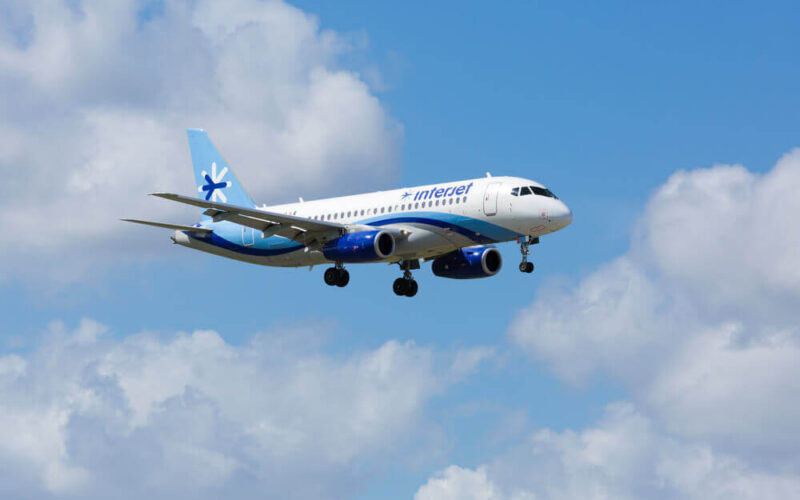The last remaining international operator of Russian Superjet 100 planes is looking to get rid of them from its fleet of 22. Russian authorities claim that decision has nothing to do with the Aeroflot accident in which 41 people died in May 2019.
Mexican airline Interjet, which is the only remaining non-Russian operator of Superjet 100, is reportedly giving up on the aircraft type, previously known as Sukhoi SSJ 100, Russian business daily Vedomosti reported on August 23, 2019.
Interjet is looking to sell “as much as possible” of its Superjet 100 aircraft, is written in the publication, which quotes three sources familiar with the matter. It is likely the sale would include 14 or 21 of the aircraft, as part of Interjet’s Superjet 100s fleet were “cannibalized” ‒ scrapped for parts to repair other aircraft. The reason for sale is allegedly the difficult financial condition of Interjet.
This is hardly the first time reports that Interjet wants to oust the Superjet 100 from its fleet emerge ‒ similar news has emerged throughout the past year, usually also pointing out the the everlasting maintenance problems and the airline’s inability to pay associated costs.
Interjet’s Superjet 100 problems
Interjet ordered Superjet 100s back in 2011, praising the Russian airliner for lower than competitors’ prices at the time. However, its operation history was far from the initial fascination, as it was plagued by a series of maintenance issues resulting in prolonged groundings of the aircraft.
Interjet has 22 Superjet 100s in its fleet. Despite being of an average age of 5.5 years, only six of them are flying. It is understood that the airline is unable to pay for needed repairs of the airliners, which has led to the grounding of the better part of the fleet.
In the first quarter of 2019, Interjet reported a 6.5% increase in operating expenses. While it is mainly attributable to higher fuel costs, the airline has highlighted that its SSJ100 fleet is also part of the problem: “Also, the amount in expenses is reflecting the gradual lag of operations of the SSJ100 fleet,” as noted in the airline’s financial report.
Superjet’s accidents and incidents
On August 19, 2019, Interjet Superjet 100 (registration number XA-DAS) was involved in an incident after both air conditioning packs on the aircraft failed, Aviation Herald reported. The airliner was performing flight 4O2119 from Monterrey to Mexico City, where it landed safely. The aircraft was returned to service.
On May 5, 2019, Aeroflot Superjet-100 (registered RA-89098) was to operate flight SU1492 to Murmansk, northern Russia. Some 30-minutes into the flight, after losing contact with air traffic controllers, pilots turned back to Moscow to make an emergency landing in Sheremetyevo International Airport (SVO). However, the landing did not go according to plan: the plane bounced off the runway a first time before landing hard on its main landing gear. The gear collapsed and the engines met the runway, immediately catching fire. Forty-one people died and eleven were injured in the accident.
A little over a week after Aeroflot Superjet 100 accident in Sheremetyevo airport, another Aeroflot SSJ 100 aircraft encountered mid-air incident, but this time made a successful emergency landing in Moscow. An Aeroflot Superjet 100-95 was en route from Moscow to Samara (Russia) when some 30 minutes into the flight, it turned back because of a loss of cabin pressure. No one was injured during the incident.
Can Superjet 100 find new international customers?
The head of Ministry of Industry and Trade of the Russian Federation Denis Manuturov reportedly denied that Aeroflot’s Superjet 100 crash in May 2019, which took 41 lives, has affected customer demand for the airliner. Manuturov told the state media agency Interfax that “new contracts are being worked out” with both Russian and foreign companies, but declined to name them.
Besides Interjet, the only other Superjet 100 operators (aside Russian airlines) were previously found in Europe. But the airliner’s operations here ended in early 2019, when CityJet, the last European operator to have Sukhoi Superjet 100 in its fleet, has returned the aircraft to the owner. The company’s decision was reportedly based on the fact that there is a huge lack of Superjet 100 spare parts that in turn causes long groundings of the aircraft.
Russian authorities refuted the latter claims. In February 2019, Sukhoi Civil Aircraft Company (SCAC) released a statement, denied the information that aircraft were returned to their owner by claiming it “contradicts the reality”. SCAC stated, however, that “currently CityJet is reconsidering its business-model, and therefore SCAC and CityJet are being under active cooperation as far as SSJ100 is concerned”.
Nevertheless, the CityJet told AeroTime it was “certainly not reconsidering its business model”, neither it was in “active cooperation” with SCAC. As for the Superjet 100, the company confirmed that “CityJet’s last commercial operation of a SSJ 100 was January 7th, 2019”.
In November 2018, the only European airline, which regularly operated Superjet 100, renounced the use of the aircraft. Brussels Airlines opted of not prolonging wet-lease contract with CityJet after it expired at the end of 2018.
At the same time, Slovenian airline Adria Airways signed a letter of intent for 15 SSJ100 in November 2018. However, negotiations between the carrier and Sukhoi Civil Aircraft Company fell through and Adria never added Superjets to its fleet.
Adria Airways expected the first of 15 aircraft from Sukhoi to arrive by April 2019, according to the Memorandum of Understanding signed between the companies in November 2018. SCAC told AeroTime that responsible financial institutions reviewed Adria Airways financial report of 2018 and recommended canceling the deal in order to prevent possible losses. The recommendation was accepted and the work was stopped.

